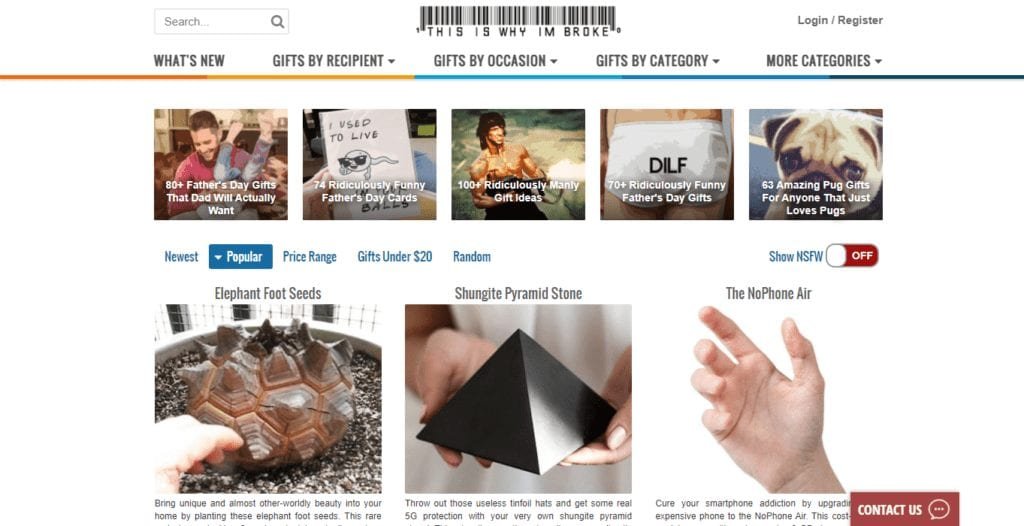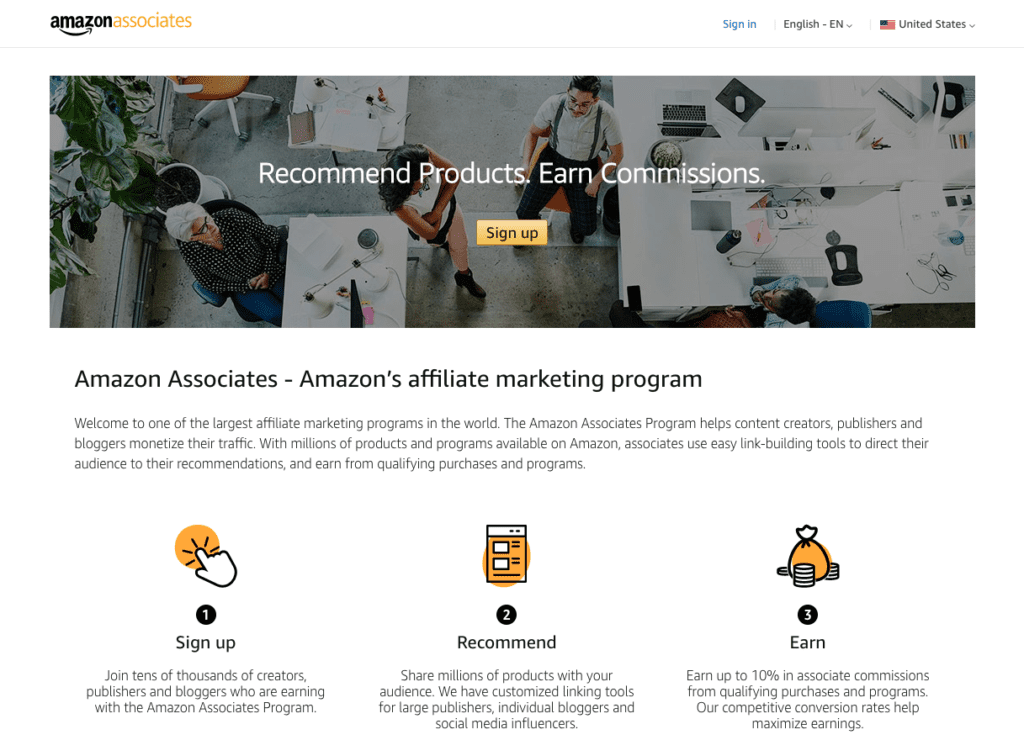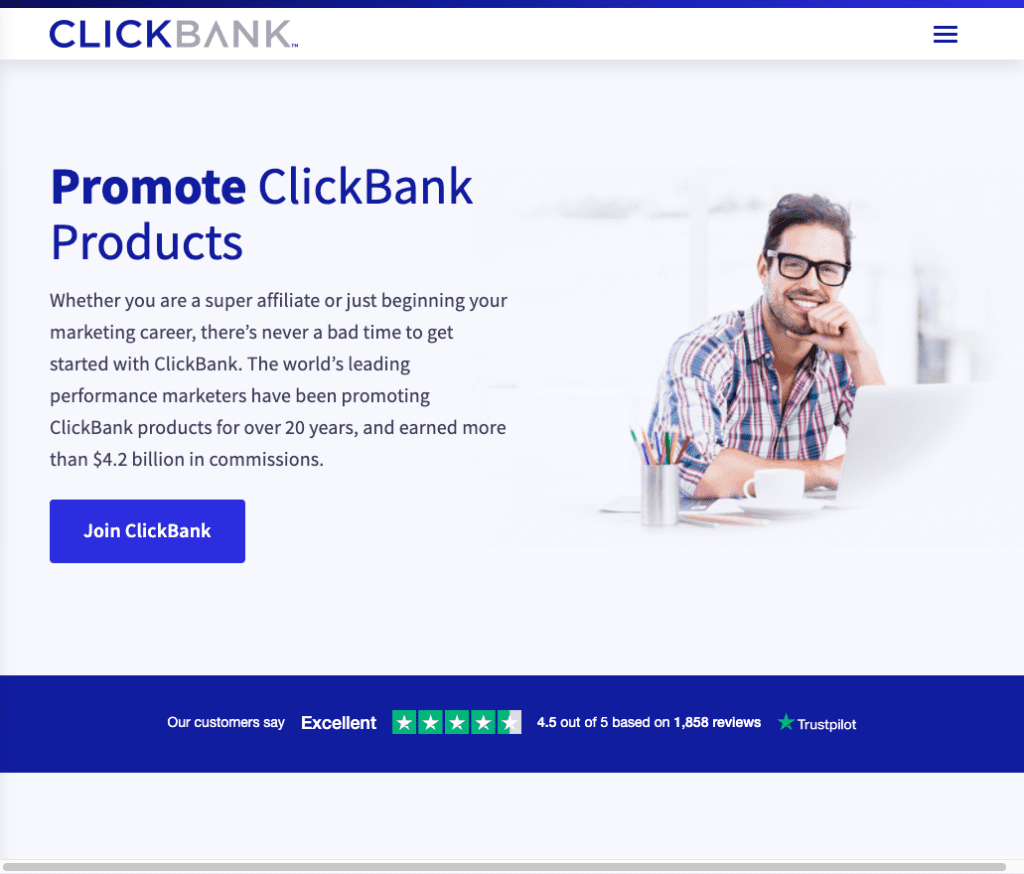Affiliate Marketing Definition and Example
In simple terms, affiliate marketing an ecommerce business model built on revenue sharing. It is selling something on behalf of someone else and earning a commission for it. If I have a product that I want to sell more of, I can start my own affiliate marketing program.
By inviting people to become my affiliate partner, they’ll promote products that I offer. Whenever someone visits their site and clicks on their unique affiliate link, then buys my product – I’d pay a commission to that affiliate marketer.
For small businesses, an affiliate program is a cost-effective way to build a sales team. Since money doesn’t need to be paid unless a conversion is made, it doesn’t cost the business as much as hiring a full-time sales team would.
If I wanted to make money as an affiliate marketer, I would build a website around a niche, then create content around it to build traffic. Then, I’d sign up for affiliate programs and include links to products I promote. Any time someone clicked my link and made a purchase, I’d earn money.
According to the Oxford Languages, affiliate marketing is, “a marketing arrangement by which an online retailer pays commission to an external website for traffic or sales generated from its referrals.”
An iconic example of a successful affiliate marketing website is This is Why I’m Broke.

It’s an Amazon affiliate site full of fun, quirky, things to spend money on. It started on Reddit from the Futurama “Shut Up and Take My Money” meme. What began as a curated list of products to share on a subreddit grew into something massively popular.

The awesome domain name and traction from Reddit gave them what they needed to successfully build a site based on stuff that people can buy but don’t really need. And now, they’ve got so much traffic, most people don’t realize they started on Reddit.
Since people can start browsing products right away, there’s plenty of income potential. The press they get, along with the sheer volume of content on the site helps them rank well in the search engines, too.
A twist on the affiliate marketing model can be seen with websites like Swagbucks and Rakuten. In exchange for making your purchases through their sites (affiliate links!), you’ll earn rewards. Swagbucks rewards you with a currency that you can redeem for gift cards. Rakuten gives you a percentage of your order back in cash and sends a check every quarter.
How Affiliate Marketing Works
There are several pieces to the affiliate marketing puzzle.

The Retailer AKA Merchant
The merchant is the person or business selling the product or service. They are the entity that created the product and needs to sell it. The advertiser can be anyone – from a blogger to a major corporation. This is the party the affiliate marketer works with.
The Affiliate Marketer AKA Publisher
This is where entrepreneurs who want to make money selling other people’s products and services come into play. You build a website, either as a personal brand or specific to a niche. Then, you use that website to draw in and market to your target audience.
You use the space to persuade your audience to learn more about and hopefully purchase, the products you’re promoting. You can use text links, banner ads, text ads, etc. to promote the product.
The Affiliate Network
This is optional, yet a common piece of the equation. An affiliate network is an intermediary between the merchant and the affiliate marketer. Generally, merchants can offer their products on it, and the affiliates can choose to participate in one or more programs of their choice. The affiliate network also manages the affiliate signup and commission process, so there’s less for the merchant to have to handle. Businesses use networks as affiliate managers so they don’t have to focus on running the affiliate program.
Share a Sale

This platform handles affiliate programs for more than 4,500 merchants. It’s great for the solo entrepreneur who wants to manage multiple programs from a single dashboard. Major brands that use Share a Sale to manage their affiliate merchants include:
- NFL Shop
- Wayfair
- Cricut
- Universal Yums
- Butcher Box
- Mabel’s Labels
You can find physical and digital products to promote here. Your commission rate and cookie expiration depend on the specific merchant you sign up with. The platform has a minimum payout of $50.
CJ Affiliate (Formerly Commission Junction)

Like Share a Sale, CJ Affiliate brings a variety of affiliate programs under a single dashboard. Though it’s fewer programs than Share a Sale – there are still more than 2,000 to choose from.
Merchants using CJ Affiliate include:
- Barnes & Noble
- Office Depot
- Overstock
- Priceline
- J. Crew
- IHG Hotel Group (Holiday Inn & Holiday Inn Express, Hotel Indigo, Crowne Plaza, and 12 other hotel brands)
Amazon Associates

This program is exclusive to products sold on Amazon. It includes products sold by third parties. The amount the affiliate earns is a flat rate depending on the item’s product category. It ranges from 1% to 10%.
What’s really great about this program is that you earn a commission on everything that someone buys, (within the cookie duration) whether it’s the product you linked them to or not. If it wasn’t already in their cart, you’re good to go.
For example, let’s say you linked to a non-stick pan for $15. But, the person ended up buying a $500 TV on sale for a lightning deal later that day, instead. You’d get the commission on the TV.
Cookies last for 24 hours, but if someone directly adds a product to their carts, you’ll get a 90-day cookie for that specific product. The minimum payout is $10.
Clickbank

Clickbank is a network primarily focused on digital affiliate products. Though it is focused on smaller brands, there are some physical products available, too. The great thing about Clickbank is you’ll find a lot of niche products that you won’t find anywhere else. For certain niches, this can be an advantage.
The average commission rate depends on the merchant you sign up with. Some programs offer a flat rate, while others offer a percentage. The cookie duration also varies depending on the merchant you sign up with but ends to be around 60 days. There is a $10 minimum payout.
The Consumer
These are the website visitors that use your website to learn more about your niche. When they read your product reviews and comparisons, for instance, they move forward in their purchasing decision.
Ultimately, when the customer is ready to buy, they’ll do through your link. Part of the purchase price covers your affiliate commission.
Without the consumer, there is no revenue to share.
Affiliate marketers are becoming increasingly transparent about the process and letting customers know where they fit in. According to the U.S. Federal Trade Commission (FTC), if you may receive compensation in exchange for promoting a product or service, you need to disclose this information to consumers.
Why?
Consumers, and people in general, are more likely to distrust a paid endorsement. You’re more likely to believe what someone has to say about a product if they’re doing it because they like the product – not because they’re getting paid to promote it. According to the FTC, if you get paid to promote a product but don’t make that clear to consumers, you’re deceiving them.
What do you disclose and when?
- The fact that you receive some kind of compensation (a commission on sales, free product for the review, etc.)
- Your relationship with the company. If the company paid for the ad, or you own stock in the company, disclose it.
- Disclose early, and often. You must disclose every time, and no one is exempt. Even if you post one sponsored tweet on your social media, you’re subject to disclosure rules.
Bloggers and social media influencers often include a disclosure statement page in the footer of their website to cover their bases. However, if it’s not prominently displayed, it may not be enough. Ideally, you should include an affiliate disclosure statement in every post. There are some unscrupulous affiliates out there that do not disclose anything, ever. That can lead to legal trouble.
Why Become an Affiliate Marketer
Many solo entrepreneurs decide to become affiliate partners with businesses so they can earn a passive income. It’s something you can do from home, on your own schedule. You won’t become rich overnight, but with consistent effort, you can build a steady income.
The affiliate marketing model is scalable. Once you get one website up and running, you can build out more properties in other niches. The more properties you have, the more revenue streams you can earn from.
Getting Paid
How you’ll get paid depends on the terms of the affiliate marketing program. Options include:
Pay Per Sale
This is the standard for many affiliate programs. When someone clicks your link and buys a product, then you get paid.
Pay Per Lead
Under this system, affiliates earn money whenever someone converts. That conversion isn’t necessarily a purchase. It may be completing a contact form, signing up for a free trial, downloading a free ebook, or subscribing to a newsletter.
Pay Per Click
With this approach, affiliates earn money by sending more traffic to the merchant’s website. You’ll be paid based on the increased traffic that comes from your site.
Your affiliate business can use a mix of these.
How Much Money Can You Earn?
This is one of the most commonly asked questions about affiliate income. And it’s also one of the most loaded. There are no guarantees of earnings with any affiliate marketing strategy. The amount you get out of it depends on many factors, including:
- The resources you put into it – If you’re not creating content and marketing your site, you can’t expect to get real results.
- The terms of the program – High ticket items pay out more but often have a long sales cycle. This means there’s more nurturing to do before someone’s ready to make the purchase.
- Your website traffic – How much you’re getting, how targeted it is, etc.
- The number of products and programs you’re promoting – A single product won’t net you as much income as multiple options.
You may earn a few hundred dollars or thousands. It all comes down to the niche you choose and the work you put into it. If you expect to be able to earn money overnight, you’ll find that the affiliate marketing industry isn’t for you.
There are plenty of involved affiliate marketing professionals who earn millions every year. The people earning that kind of money are engaged full-time and have an affiliate marketing system in place that makes it easy for them to continue scaling their business.
How to Get Started as an Affiliate Marketer
Follow these steps to get started.
Choose Your Platform
The great thing about the affiliate marketing business is that there are several approaches you can use. Common methods include:
- Niche Review Sites: With this method, you’ll create a website that reviews products targeted toward a specific audience. Then, you’ll compare a line of products against the competition. It’s what you see here. I review and compare ecommerce platforms. This method requires you to create a great deal of content related to reviews, but to expand outside of the reviews themselves. You’ll need to post on a regular basis to grow your audience.
- Courses, Workshops, and Events: As an educator, you can include affiliate sales offers in your events.
- Digital Content: This is what bloggers, social media influencers, and YouTubers use. By creating niche content that connects with the target audience, affiliate marketers organically introduce products their audience will enjoy. When the products resonate with the audience, there’s an increased likelihood they will buy, thus giving you a commission.
So which platform and method are right for you? As you decide, consider:
- What platforms do you use most often?
- Which of those platforms do you understand well?
By starting with a marketing platform you already know, you’ll be better equipped to craft the content it takes to foster a strong, engaged audience.
Niche Research
It may be tempting to go for a niche that you know is popular and pays out well. Instead of following the dollar signs, go for something you know and are passionate about.
That in itself will go a long way toward creating an authentic connection with your audience. You’ll be able to build trust and credibility with the audience. And, you’ll be better able to evaluate products and brands to promote.
If you’re a chef, you could easily start a recipe blog with cooking demos. Your revenue can come from ads on your videos. You can write product reviews for common gadgets and add an affiliate link for any items you review. This provides an additional revenue stream. As your website grows, you have more chances to earn.
The niche you choose for your site determines the resources (time and money) have to put into your affiliate marketing efforts. If you’re interested in a niche where there’s already a lot of competition, you’ll have to work hard on search engine optimization (SEO) and marketing before you’ll start to see results.
Affiliate Program Research
What matters here is that you find products and services that align with your ideal audience, or the audience you want to build. If it’s not something that people need, want, or find valuable, you’re wasting time. It should always fit within your expertise and make sense. If you’re a foodie, you wouldn’t be promoting beauty or home improvement products.
Most affiliate programs want to work with publishers that have an established audience and traffic. In other words, you can’t build a website in a matter of hours, slap up some content, and start throwing affiliate links in.
You’ll need to build out your content with the idea of adding in links later as you start to build traction.
But, there’s nothing wrong with doing research on affiliate programs you want to join when it’s time. If there are specific products or services you want to promote, you need to familiarize yourself with the terms of their program. This way, you know what kind of traffic you need to generate sales and reach your goals.
Depending on the products or services you want to promote, you may have to sign up with multiple programs. Some businesses offer their own affiliate programs directly. Others, rely on affiliate networks to manage the programs for them. If for instance, you find a brand that runs through Commission Junction, you’d have to create an account there then apply to join the program. And if you find another that runs through Clickbank or Share a Sale, you’d have to sign up with those affiliate platforms then apply to join those programs, too.
Your Affiliate Website
The web is full of affiliate websites, all trying to earn your click. To stand out from the crowd when you promote products, your website needs a lot of attention.
If you want to make money with affiliate campaigns, you have to have web traffic. And not just any traffic will work. To build a smart passive income, you want to attract people who are interested in whatever product you’re promoting.
That takes a lot of research and understanding the fundamentals of digital marketing. Research what your competition is doing, then come up with a plan to make yours better.
Affiliate Marketing Channels
Your Website
An affiliate’s site is the hub for all products and campaigns. It’s where you establish your trust and expertise. It’s where you connect with your audience. It’s the home for all your content.
For each niche you’re actively involved in, you can build a website with the necessary site functionality to support reviews, comments, affiliate links, disclosures, etc.
Social Media
Building a social media following can help foster loyalty with your audience. It’s a great way to share your content. But more than that, you can share things that your audience will find useful – even if you didn’t create the content yourself.
When it comes to social media, focus your efforts on the channels you know your audience is most likely to be. Don’t try to be everywhere at once – because your strategy will suffer. Instead, focus on the top two or three channels your audience uses the most, and do those well.
Email Marketing
If you really want to start making money as an affiliate, you’ll want to build an email list. Email marketing gives you another way to connect with your audience. You can share exclusive offers with your subscribers, too.
Influencers
A lot of what influencers do is affiliate marketing work. When you establish yourself as a niche expert with a following, you can leverage that status as an influencer. More brands will work with you, giving you a chance to promote more products and earn more money.
If you’re not quite at influencer status, you can collaborate with other influencers to increase brand awareness and build your following.
Ads
Until you start building traction with SEO, you can run ads. Use Google AdWords or social media ads to build your following and promote your content.
Tips for a Booming Affiliate Marketing Business
Study Digital Marketing
To make the most of your efforts, you need to be able to promote your online business. That means understanding things like keyword research, search volume, and search intent.
Research helps you find the words and phrases that someone looking for your content might use to find it in Google searches. Getting the keywords ahead of time makes it easier for you to write your blog post.
You can use tools like Google Ads Keyword Planner to help you find the right ones to target. Take time to search for the word or phrase to see what’s already there. Look at the sites themselves, but pay attention to the kind of content that’s there, too. If the query spits out a bunch of product reviews, then writing a review makes sense. If not, then the intent isn’t there. You’ll never rank if the content doesn’t match search intent, too.
Authenticity is Key
To be a successful affiliate marketer, you have to be authentic. People will be able to tell if you’re just creating content for the sole purpose of trying to make a quick buck. People will also be able to tell if you don’t have a clue what you’re talking about – no matter how much you try to convince them otherwise.
Be Choosey About Products You Recommend
If you recommend everything that comes across your path, you’ll lose trust and credibility with your audience. Making money as an affiliate is based on people trusting your recommendations enough to follow through with the purchase process.
If you wouldn’t use it yourself, then you probably shouldn’t be recommending it. When you review products – be honest. You can still include an affiliate link to something you wouldn’t necessarily use – in case there’s someone who decides to use it anyway. The key is honesty. Provide your opinion based on your real experience – not the potential money you’d earn from a purchase.
Create High-Quality Content
No matter what products you recommend through an affiliate marketing program, there are a few ways to handle the content. When deciding the kind of content you want to create, you’ll first need to consider your angle.
Reviews
If it’s a product or service, you can write a review detailing your experience with it. Include pros, cons, and how it stacks up against the competition. Add video to your reviews to add value to your content.
Tutorials
If you’re working with a product that could benefit from demonstrations, you could make more affiliate sales with a series of tutorials. This works well for software products because you can create screen capture videos that walk users through how to accomplish something with the product you’re promoting.
Expert Interviews
For some products, it makes sense to conduct expert interviews. Using platforms like Help a Reporter Out, you can connect with experts. Then, develop content around the information you collect.
Promote a Variety of Products from Several Merchants
To really generate revenue, you should promote more than one product or service. Each piece of content on your site should focus on your audience, so you don’t want to have a constant sales pitch. But, that doesn’t mean you can’t naturally work more than one affiliate product into the mix when and where it makes sense.
Using your keyword research to find out what people are looking for helps you see the kind of topics you need to cover on your website. Write for customer satisfaction first and foremost – and then think about where products could fit.
The more products an affiliate promotes, the greater chance of earning a few dollars. Varying the affiliate marketing offers also ensures you have offers for every type of visitor and budget.
Develop a Distribution Plan
Once you create the content, you’ll need to determine how you’ll spread the word. Using social media platforms like Facebook and Instagram can help you connect with your target audience. If you have an email list, share the new content with your subscribers.
Test, Analyze, Adjust, and Repeat
Install Google Analytics on your website. This will provide you with plenty of valuable information about who your audience is, how they found you, and how they’re interacting with your site. Use this information to guide your future content and marketing strategy. Make adjustments from time to time. Analyze the results. Adjust again, and repeat. Over time, you’ll be able to determine exactly the kind of content that your audience loves, so you can give them more of what they want.
Start Affiliate Marketing Today
Affiliate marketing is a great way to start making money online without a lot of risks. While having the capital to invest in marketing and ads can help, ultimately all it really takes is your time. If you invest the time upfront, you can earn a nice income. And as you grow, you can scale your efforts into other niches.









